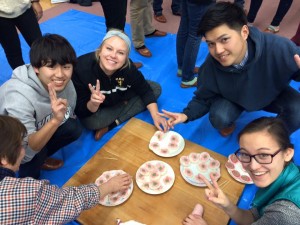Throughout our time here in Japan we have seen and experienced many foods that are “normal” in Japanese culture, but would be considered strange or even elegant in American cultures. But elegant, strange, or normal, food is food. Everyone eats. Everyone eats to survive. Just like we breathe air and drink water. In my time so far in Japan I have also come to notice that food has a deeper meaning than survival. Food is used almost as a “selling point” to have people come together and bond. Families and friends celebrate holidays over meals. They also celebrate special events, and most of the time come together at the end of the day for a meal. Food can mean somehing different for everyone. Most families and cultures have their own traditional food that they make or eat specially every year. I come from a Norwegian family where we make lefse every year and eat it on holidays.

Cooking fish at the street fair

I was not brave enough to try the squid at the street fair
As humans living in a civilized, modern world, we take pleasure in eating. Things look and taste good. The brain releases a natural “pleasure chemical” called b-endorphins when we eat our favorite foods. In Japan I have noticed that to be foods like octopus, squid, shrimp, or noodles of sorts. In America I have noticed that to be foods like fancy meats, or in my case pizza. I have wondered why food varies so much from culture to culture? Why are we so comfortable with our food? Why is it so hard for some of us to eat outside of our box? From an early stage we expect palatable foods to positively influence and reinforce our emotional state; making our emotional state, our “box” highly highly susceptible to influence from the type of food we consume. As humans we have grown more civilized and moved beyond the era that we ate simply to survive, our relationship with food evolved along with us. Now we eat just as much for pleasure as anything else. We have learned to associate foods we find tasty with the expectation of an elevated mood. Throughout our lives we have come to associate snacks and treats like cookies, candies, and cakes with special occasions and childhood rewards. We then take this into adulthood. So we tell ourselves “I deserve this double chocolate pound cake” or, “I deserve this double espresso mocha.” Sugar is not common in all countries or cultures. We could instead suggest a nice bath or going to sleep early instead of indulging ourselves with high calorie snacks that are not only bad for us, but bad for the environment.

This candy is more up my alley

Creative food with studenta from Japan and Taiwan in Nagawa-machi
One thing that has struck me has been the way food is prepared in Japan compared to the way food is prepared in the United States. First, in the United States you buy food in family sizes. If you want food in individual sizes you mainly have to rely on fast food or prepare something on your own. In Japan you buy things in individual sizes and prepare things for larger portions. There also is not a prevalence of fast food restaurants that I have seen. Where as in the United States, in almost every town there is a competition of fast food restaurants, they are everywhere.
Are people in Japan healthier than Americans? If so is it because of fast food? Americans have become more dependent on convenience and fast food, while here at ARI we eat home grown vegetables and cook every meal. Our moods, like our bodies, do much better with fresh, whole foods that provide plentiful proteins, vitamins, minerals and healthy omega–3 fats. America is a busy place, but Tokyo is busier. So why do Americans seem to be more stressed? Traveling through the Tokyo train station and through the city I have not run into anyone who seems stressed. At least in my opinion, I don’t know what people are going through though. As busy and chaotic as it is, everyone seems to have their cool. I’m the stressed one if anything. With the research I have done, it comes from our diets. Many of our modern day issues come from a collission between stress and poor eating habits. Seratonin is a neurotransmitter that keeps your mood upbeat, found in fish, eggs, chicken, turkey, and other meats. GABA helps you stay focused and calm, found in legumes, brown rice, and spinach. There are many more but these are the two main ones staple in the Japanese diet that you won’t find in the average American diet. I have learned a lot on this trip and this has been the most influential helping me thimk about the way I eat.

Recent Comments